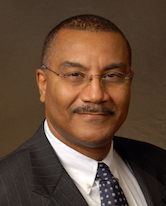 |
Joseph S. Francisco was President of the American Chemical Society from 2009-2010. He served as the William E. Moore Distinguished Professor of Physical Chemistry, and, Earth and Atmospheric Sciences at Purdue University in West Lafayette, Indiana. He received his bachelors degree from the University of Texas at Austin in 1977 and his PhD from the Massachusetts Institute of Technology in 1983. He was President of the National Organization for the Professional Advancement of Black Chemists and Chemical Engineers from 2006–2008. He is also a fellow of the American Physical Society, the American Association for the Advancement of Science, American Chemical Society, and a Guggenheim Fellow. He was awarded an Alexander von Humboldt U.S. Senior Scientist Award, appointed a Senior Visiting Fellow at the Institute of Advanced Studies at the University of Bologna, Italy; Professeur Invité at the Université de Paris-Est, France; a Visiting Professor at Uppsala Universitet,Sweden; and an Honorary International Chair Professor, National Taipei University of Technology, Taiwan. He was elected as the Fellow of the American Academy of Arts and Sciences in 2010 and was elected member of the U.S. National Academy of Sciences in 2013. He also received Honorary Doctor of Science Degrees from Tuskegee University in 2010 and the University of Arkansas at Little Rock in 2011. He was appointed to serve on the President’s Committee on the National Medal of Science for the period 2010–2012 and 2012–2014.
Research in Dr. Francisco’s laboratory focuses on basic studies in spectroscopy, kinetics and photochemistry of novel transient species in the gas phase. These species play an important role in atmospheric, biochemical and combustion processes. Yet questions dealing with how structures correlate to reactivity and photochemical mechanisms have not been addressed for these systems. These problems are addressed by research efforts in our laboratory. Specific research areas of interest are: 1) Spectroscopic determinations of electronic and vibrational transitions in free radicals; 2) Measurement of the kinetics of individual gas-phase reaction steps involving free radicals in complex reaction mechanisms; and 3) Characteristics of primary photo chemical processes that free radicals can undergo. Theoretical and experimental methods are used cooperatively in extending spectroscopic information on these species. Our goal is to use state-of-the-art molecular orbital methods to predict the properties that can be used as a guide in the experimental search. Using a variety of high resolution laser techniques, such as laser-induced fluorescence, vibrational and electronic emission, multi-photon and UV absorption spectroscopy, we aim to make spectroscopic measurements for these novel species in the gas phase, and fully characterize them. Dr. Francisco has published more than 400 journal articles, written nine book chapters, co-authored the textbook Chemical Kinetics and Dynamics, and served on numerous national science councils. Joseph Francisco has most recently been appointed as the Dean of the College of Arts and Sciences at The University of Nebraska-Lincoln. Ellen Weissinger, senior vice chancellor of academic affairs announced this appointment of Dr. Francisco as dean of the university’s largest college. “As a researcher and an educator, Joe has demonstrated the highest level of performance at every stage of his career and he has a rare talent for inspiring excellence in others,” Weissinger said. Dr. Francisco will begin his new duties on July, 1, 2014. |
![]()


